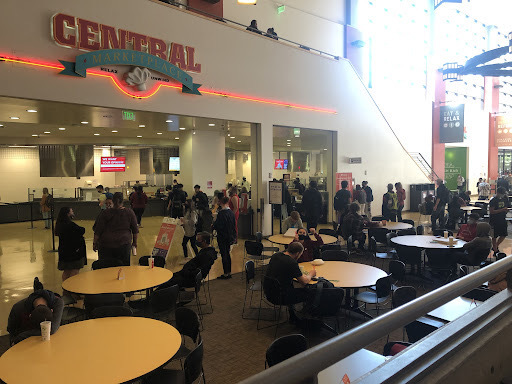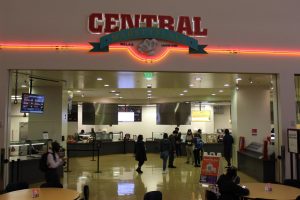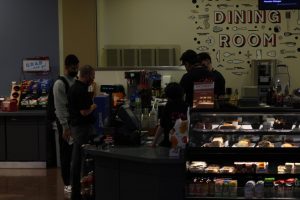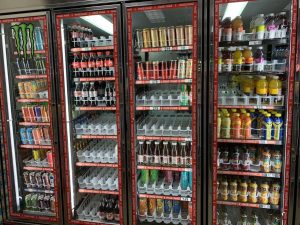Understaffing at dining services causes problems
Employees and students complain about long lines, reduced options, food quality and more

Lines in Central Marketplace can often be seen wrapping around the entrance.
October 28, 2021
If you’ve walked through the SURC Dining area since fall quarter began, you’ve probably heard rumblings of discontent about Dining Services.
Students who rely on dining services for all of their meals say they’re tired of waiting in long lines and have noticed a decline in food quality since last year. Dining Service employees say they’re feeling overworked, overlooked and underappreciated.
Dining Services is severely understaffed this quarter, with just a little over half the student employees as what they’ve had in previous years, around 250 versus the usual “400 plus,” according to Director of Dining Services Dean Masuccio.
“We’re still in need of another probably 40 to 50 students that continue to fill in the gaps that we’ve experienced,” Masuccio said.
The Observer spoke to four current and four former Dining Service employees and a dozen diners to get a sense of the problems and how they are being addressed.
Long lines and mobile ordering
Understaffing has led to excessive wait times at most dining locations. Mobile ordering, which was useful during the 2020-2021 school year with the reduced number of students living on campus, has backed up completion of in-person orders, according to employees.
“The lines are also insanely long during most times of the day,” a student surveyed by The Observer said.

An employee who has been working multiple dining stations at Central Marketplace for two years said, “We’re dealing with people that are in-person ordering food, but then we’re also having online people. So trying to do all of it at once, it’s a lot busier compared to last year. There was mobile ordering, but because not many students were on campus, it wasn’t that busy. But being at full capacity, having students out there in the dining hall while trying to do online orders, we got a lot busier.”
This employee, like others The Observer spoke with, asked to remain anonymous due to a concern about job security.
Masuccio said that mobile ordering was introduced in the fall of 2020, and was fast tracked to campus during COVID-19 in order to, “come up with some remedies to help with expediting the service and just keeping congestion minimal in the dining hall and other locations, so that went well. But we realized that the mobile ordering solution that we had selected likely wasn’t the best long term fit. So therefore GrubHub was brought on and has helped with a lot of the same things that we brought on the previous version.”
Reduced options and hours
Many dining options have been temporarily closed, and certain operation hours have changed. El Gato, a popular Mexican food option in the SURC, has been closed since the beginning of the quarter. Once open 24-hours a day, The Bistro now closes every day at 3 p.m. and remains closed through the weekend. North Cafe opened for a few days and once again shut its doors.
Several people surveyed by The Observer said they were disappointed by the changes.
Masuccio said the closures are caused by understaffing.
“Some of the mitigation strategies that we’ve introduced to kind of compensate for the lack of staff is reducing operations and focusing on the more centralized locations such as the SURC,” Masuccio said. “We continue to focus on existing operations rather than opening more.”
“I know that our students would like to see more available but then it puts a strain on our staff. So it’s that double-edged sword that we’re trying to navigate towards.”
A full-time cook on the staff at Dining Services, who also asked to remain anonymous, said they agree with the closures.
“Take a step back. It’s quality over quantity,” they said. “Instead of stretching us thin, where you’re having one cook try to open three stations, and have it run legitimately with quality food, we need to take the time to train and properly do each station. I’m not saying close everyone down, but we need to close a few. Less is more, that’s what I like to say.”
Food quality and service
CWU students who utilize Dining have commented on issues of food quality.
“I used to get pizza and Lion’s Rock more often,” said junior psychology major Lizzie Main. “I stopped eating the pizza because it started to make me feel sick. I stopped eating at Lion’s Rock because I got served a raw burger. The outside was brown, but the inside was completely soft and pink.”
Main said she understands and empathizes that dining is “really understaffed and very busy especially around peak mealtimes,” but she’s worried about people getting sick. She said she got a refund, but still felt unwell, since she didn’t realize it was raw until after a few bites.
Main said her roommate also had an unpleasant experience with a meal.
“The next week, my roommate ordered a Caesar salad at the Fresh Bar,” Main said. “About halfway through the salad, she nudged me and pointed at a moth that was in her salad. The top half of a moth with its black beady eyes staring at us! She got a refund after that as well, but she still grimaces when she thinks about it.”
One student interviewed at the SURC pointed out a lack of consistency.
“The portion sizes change every single day, especially in the Central Marketplace, less so in Holmes,” they said. “Holmes is like standard and a little bit more mediocre, versus the Central Marketplace is like a roulette wheel you never know what you’re gonna get. Flavors change, I feel like the Lion’s Rock is probably like the most consistent one.”
Management
Dining Service employees voiced concerns about lack of communication and transparency from management. They discussed issues with scheduling, breaks, lack of training and feeling underappreciated.
“It was very clear that the expectation was that we were to be robots,” said Sierra Moore, a former employee of two years, starting in winter of 2020. “We weren’t allowed to talk to each other in the stand … if you were lucky enough to be set with another person and were laughing or just having a conversation, even if there were no customers around, you would be told to be quiet.”
Moore said that due to understaffing and rushes, breaks were sometimes disregarded.
“I was put in a stand by myself for five hours a day, multiple days a week. And if the manager wasn’t around … I wasn’t allowed to go to the bathroom. I missed my breaks multiple times.”
Moore added, “Staff members aren’t allowed to drink water on shift … There were days where I would be scheduled for two hours, which is one of their most common shifts, and ended up staying for closer to 12.”

She said she brought up these concerns with her manager, who responded by saying there wasn’t anything that could be done since they were short-staffed. She tried to go to higher-up management and said she felt the issue was “blown under the rug.”
“Eventually, they just cut my hours because I was making a little bit of a fuss,” claimed Moore.
“Everyone who had the same kind of concerns were treated as though we weren’t being loyal to dining, and that we were complaining too much.”
Masuccio responded to various complaints regarding mistreatment.
“You can’t be drinking and eating behind a counter, right? I don’t think our guests would appreciate that. So they are to leave the counter to have a drink. You know there’s water stations or beverage stations, they do get three free beverages during their shift as well.”
“I’m not saying those claims weren’t expressed,” he said, adding, “but I believe and I would expect that all staff are able to get a drink of water when they’re thirsty.”
Masuccio said employees are free to buy food on their breaks, and that breaks are absolutely necessary.
“Not being allowed to take a break, that’s not acceptable,” he said. “So I would say I have not heard of that.”
New hires and training
“A lot of our team members are new, which in turn are training new students that are new,” Masuccio said. “So it’s a trickle-down effect … Those are some of the challenges that we continue to push through and try to navigate through this quarter and beyond. I don’t see a complete resolution in the next month or beyond.”
“We keep pushing forward with strategies to help mitigate a lot of the challenges that we experience, but I do recognize that it’s been felt by staff and others.”
Freshman diner Megan Stanley said, “Hopefully they end up hiring more people to ease the workload, because I have some friends who work in dining right now … and there are not enough people. That’s because of COVID-19 last year, we got less students on campus and therefore less students want to work.”
Jenna Flores, a former employee who quit after two years, said, “It’s the fact that they’re so understaffed that nobody wants to work there. People will quit on their first day, because of how they’re treated.”
The full-time cook said, “Right now, they’re struggling to keep people in here, so they’re just kind of throwing them in … Most of the students have never had training … they haven’t even held a knife, so that scares me.”

The full-time cook said that while hourly staff (mostly made up of students) are dwindling in numbers, many higher up positions are being added, many of whom also lack experience.
“I think it’s top heavy,” they said. “They’re hiring people with no experience … there’s a supervisor that just started [with] no kitchen experience. Zero. How can you supervise a kitchen when you don’t even know how a kitchen is run?”
Fox Alford, who has been working for Dining since spring quarter of 2021, said he feels his work is being overlooked.
“The place could have caught on fire and management wouldn’t notice,” Alford said.
Alford said he is frustrated over the lack of communication from upper-management, especially when it comes to scheduling.
“They’ll put you where they want you, unless you actively complain and have the seniority enough to threaten to quit,” Alford said. “They seem to make promises a lot and not keep them, especially when it comes to our schedules.”
The full-time cook agreed that more transparency and appreciation from management would be helpful.
“It’s just broken promises. I don’t want to be lied to or told what they think we want to hear,” they said. “Listen, if we’re short-staffed, you just tell me. ‘Hey, we’re super short-staffed, I get that you’re working really hard,’ you know, being noticed a little bit. I think we’re just trying to compete with egos.”
Masuccio said, “There might be situations where staff is unhappy. I completely recognize that, and we’re trying to get in front of that as much as we can to get past this hump.”
“Fall of 2021 will go down in the record books as the most difficult,” said Masuccio.
Nationwide Issue
Central is not alone in these struggles. According to an article last week from Inside Higher Ed, “Institutions across the U.S. face a shortage of dining hall workers.”
“And these shortages are not unique to higher education,” the article continued. “Businesses across the country are desperate for employees. But because universities serve largely captive populations whose families often pay a lot for their residential experience, they are especially invested in finding ways to staff their housing and dining services.”
Freshman diner Iris Keck said, “Honestly, CWU is handling the whole COVID stuff really gracefully, and I think that is very admirable for how big it is … I think this place is definitely an oasis for COVID safe operations, and I think other places should follow suit.”
Masuccio said, “Overall, I think that we are doing everything we can in our power to get in front of some of the challenges that have been described.”
“The grace factor needs to come into play because the entire industry is short-staffed,” Masuccio continued. “The entire industry is struggling with the same topics that we’re talking about. It’s not isolated to CWU. It’s not isolated to CWU Dining.t’s not isolated to Ellensburg. This is a national problem.”
“We’re trying to do everything we can to correct the gaps that we currently continue to experience,” Masuccio said.
Additional reporting by Milenne Quinonez, staff reporter and Sean Bessette, Editor in Chief

Ann Marie • Jan 20, 2022 at 5:26 pm
To bad they fired some amazing people!!! My husband worked there and the new management was horrible to all staff that had been there for so many years sad they blame understaffing now they came in an had bad bad management!! Denise and masuccio !!! Take a look in the mirror!!! Shame shame on you!! The employees they pushed out were phenomenal !!!!! They should be the ones cooking since they fired so many!!!!!